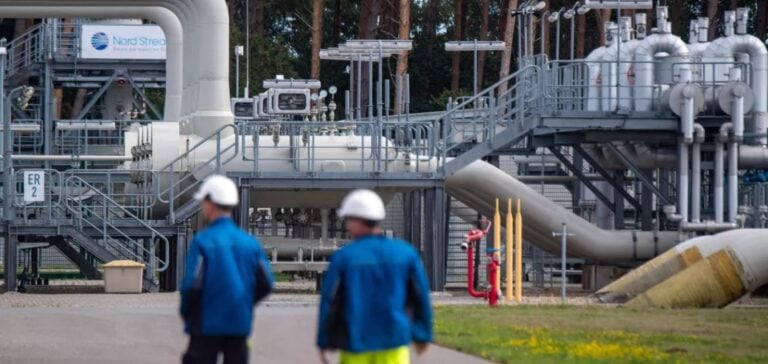The readings from early 2025 confirm a concerning decline in gas stocks within the European Union (EU). They stand at an average filling level of 58.5%, compared to 74% at the same time in 2024. This nearly 16-point difference highlights the difficulty in compensating for the sharp reduction in Russian flows, which have been interrupted via Ukraine since January 1. On the markets, the TTF (Title Transfer Facility) contract – the benchmark for gas prices in Europe – is now hovering around 50 euros per megawatt-hour (MWh), reflecting ongoing uncertainties about the balance between supply and demand.
Differences Between Member States and Evolving Obligations
At the national level, the situation varies significantly. In Germany, storage facilities are at 60%, a ten-point decrease compared to January 2024. France records 55%, while Italy stands at 52% despite a harsher winter and sustained industrial consumption. In the Netherlands, the scheduled closure of the Groningen gas field has reduced capacity, maintaining a storage level of 48%. In contrast, Poland and several Baltic countries are near 53%, thanks to early purchases and lower demand. In light of this heterogeneous situation, the European Commission (EC) has increased the storage obligation from 45% to 50% by February 1, 2025, urging member states to rebuild their reserves earlier. Several governments are considering support measures for operators, although some investment banks warn that these could create artificial price pressure.
Exchanges within the EU also highlight the need for better coherence in national policies to prevent shortages and cushion tariff shocks. Various reports, including those from the International Energy Agency (IEA), warn of potential increased volatility if deliveries do not offset the decline in Russian flows. Bilateral solidarity options, initially envisioned in the European regulation of 2017, have yet to result in a systematic deployment, despite the solidarity mechanism established in 2023. Experts recommend accelerating these agreements to mitigate the risks of imbalance during the winter months.
Growth of LNG and Logistical Constraints
Diversifying supply remains one of the major responses to the halt in Russian deliveries via Ukraine. Liquefied natural gas (LNG) imports – notably from the United States, Qatar, or North Africa – have significantly increased, providing a more flexible import volume. However, observers note the growing competition from Asian buyers, especially China, whose rising demand could drive international prices higher. Additionally, not all European regasification terminals are operating at full capacity, sometimes extending delays during peak consumption periods.
These issues are compounded by the need to develop more robust transport infrastructure. Several projects of common interest (PCIs) aim to strengthen the pipeline network and modernize underground storage facilities, with EU financial support through the Connecting Europe Facility. Despite progress in some areas, monitoring by the Commission and the Agency for the Cooperation of Energy Regulators (ACER) reveals delays, a lack of coordination in planning, and sometimes uncertain profitability linked to the future evolution of gas demand.
Industrial Perspectives and Future Strategies
Gas-intensive industrial sectors, such as chemicals and steel production, must contend with rising energy bills and possible restrictions on available volumes during peak demand periods. In some cases, companies are revising their production schedules during the winter to limit exposure to price fluctuations. This situation raises concerns about European competitiveness, already strained by high operational costs and international tensions.
From the European Commission’s side, several avenues are being explored to strengthen supply security. Among these is the partial pooling of purchases through the AggregateEU platform, which aggregates requests from several operators to negotiate better deals with suppliers. However, the real impact of this mechanism remains difficult to assess, given the lack of visibility on the contracts concluded and the preference of some large companies for bilateral negotiations. The overarching goal remains to stabilize the market to avoid price surges similar to those in the summer of 2022, when gas prices reached over 300 euros/MWh.
Energy Resilience and Regulatory Challenges
The implementation of increasingly stringent minimum storage thresholds reflects the EU’s intent to safeguard against potential supply disruptions. Many member states have also announced accelerated energy transitions to gradually reduce their reliance on fossil gas. Measures for energy savings, the deployment of renewable units, and investment in carbon capture and storage (CCS) research are among the strategies identified to limit the impact of international tensions.
Although coordination efforts are progressing, analysts highlight persistent weaknesses: the absence of stable contracts with certain alternative suppliers, fierce competition in the LNG market, and difficulty harmonizing policies across member states. Emergency strategies will, therefore, need to combine targeted investments and appropriate regulation, in a context where gas prices are influenced by a variety of geopolitical and climatic factors. In the short term, rebuilding stocks remains the priority, as the EU aims for a 50% threshold by February 2025 to limit the risks of shortages at the end of the winter season.






















